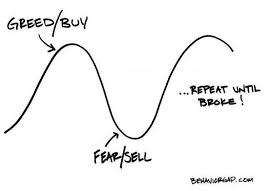Avoiding the Fear-Greed Cycle

“Investment results are more dependent on investor behavior than on investment performance.” (DALBAR, Inc.)
DALBAR is a quantitative research firm that uses data from the Investment Company Institute, Standard & Poor’s, and Barclays Capital Index Products to compare mutual fund investor returns to an appropriate set of benchmarks. DALBAR has been performing these studies for well over ten years, and the results consistently show that individual equity investors substantially underperform market equity returns.
Study after study shows that when the stock market goes up, investors put more money in it. When it goes down, they pull out. As a result, they are consistently buying high and selling low!
Overreacting—either to greed (chasing returns) or fear (panic selling) is never good. Investment professionals tend to describe such behavior as “irrational”, but deeper analysis may indicate that such behavior isn’t particularly irrational at all.
Imagine what our ancestors must have faced in a world that was much less friendly than today’s. Whether dealing with settling the frontier or trying to eke out a living during the depression or engaging in combat, there was much to be said for letting fear direct your behavior. Moreover, when things were going good, whether from a successful crop or from winning an election, it made sense to go for all you could get.
However, that doesn’t work in investing. History shows that the market has gone up over long periods, but it has also gone down over shorter periods. Reacting to short-term market declines by selling is likely to underperform the investment markets or even your own holdings, as is reacting to market advances by buying (particularly at the top of the market!)
The best way to deal with market uncertainty? Determine ahead of time how much volatility you can live with and build your portfolio—a broad mix of stocks, bonds, and other investment assets—to accommodate that risk. Then stick with your plan. When stocks advance, rebalance the portfolio again (selling stocks) to capture the gains you’ve recognized and keep your allocation at your predetermined target. This means you’ll be doing the exact opposite of what your emotional fear-greed cycle tells you that you should and it takes real courage to stick with your strategy.

